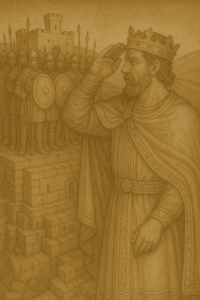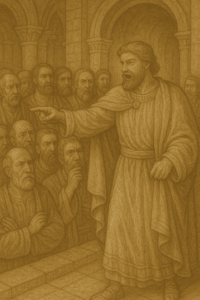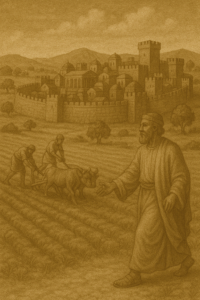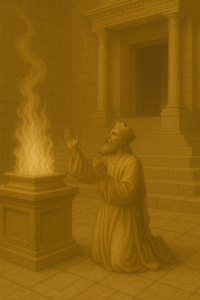Deuteronomy 34 is a chapter that describes the final moments of Moses’ life. Standing on Mount Nebo, Moses views the Promised Land before passing away. This chapter highlights the fulfillment of God’s promise, the end of Moses’ journey, and the transition of leadership to Joshua.
The context of Deuteronomy 34.
In Deuteronomy 34, Moses, after leading the Israelites out of Egypt and through the wilderness for 40 years, views the Promised Land from Mount Nebo. God shows him the land promised to Abraham, Isaac, and Jacob, but Moses is not permitted to enter it. Moses dies on Mount Nebo, and the chapter concludes with a reflection on his unparalleled legacy and the peaceful transition of leadership to Joshua.
Key themes in Deuteronomy 34.
- Fulfillment of God’s promise: Moses sees the Promised Land, fulfilling God’s promise to the patriarchs. This moment signifies the culmination of the Israelites’ journey and God’s faithfulness.
- Moses’ final moments: The chapter details Moses’ serene final moments as he views the Promised Land. His death marks the end of an era for the Israelites.
- Legacy of Moses: Moses is remembered as a unique prophet who knew God face to face. His leadership, miracles, and dedication to God’s commandments left an indelible mark on the Israelites.
- Transition to Joshua: The chapter emphasizes the peaceful transition of leadership to Joshua, who is filled with the spirit of wisdom. This transition ensures continuity and stability for the Israelites as they prepare to enter the Promised Land.
Lessons from Deuteronomy 34.
- God’s faithfulness: The fulfillment of God’s promise to show Moses the Promised Land underscores God’s faithfulness. Reflecting on God’s promises encourages trust and faith in His plans.
- Legacy and leadership: Moses’ legacy as a leader and prophet highlights the impact of faithful service. His life serves as an example of dedication, humility, and obedience to God.
- Embracing transitions: The transition of leadership to Joshua demonstrates the importance of embracing change with faith. Trusting in God’s provision for new leadership ensures continuity and stability.
- Reflecting on God’s plan: Moses’ view of the Promised Land from Mount Nebo invites reflection on God’s overarching plan. Recognizing our part in God’s plan helps us appreciate our journey and God’s guidance.
Conclusion.
Deuteronomy 34 provides a powerful reflection on the end of Moses’ journey, the fulfillment of God’s promise, and the transition of leadership to Joshua. As we reflect on this chapter, we are reminded of God’s faithfulness, the importance of leaving a lasting legacy, and the need to embrace transitions with faith. By following these principles, we can trust in God’s plan and continue to serve faithfully in our own lives.






